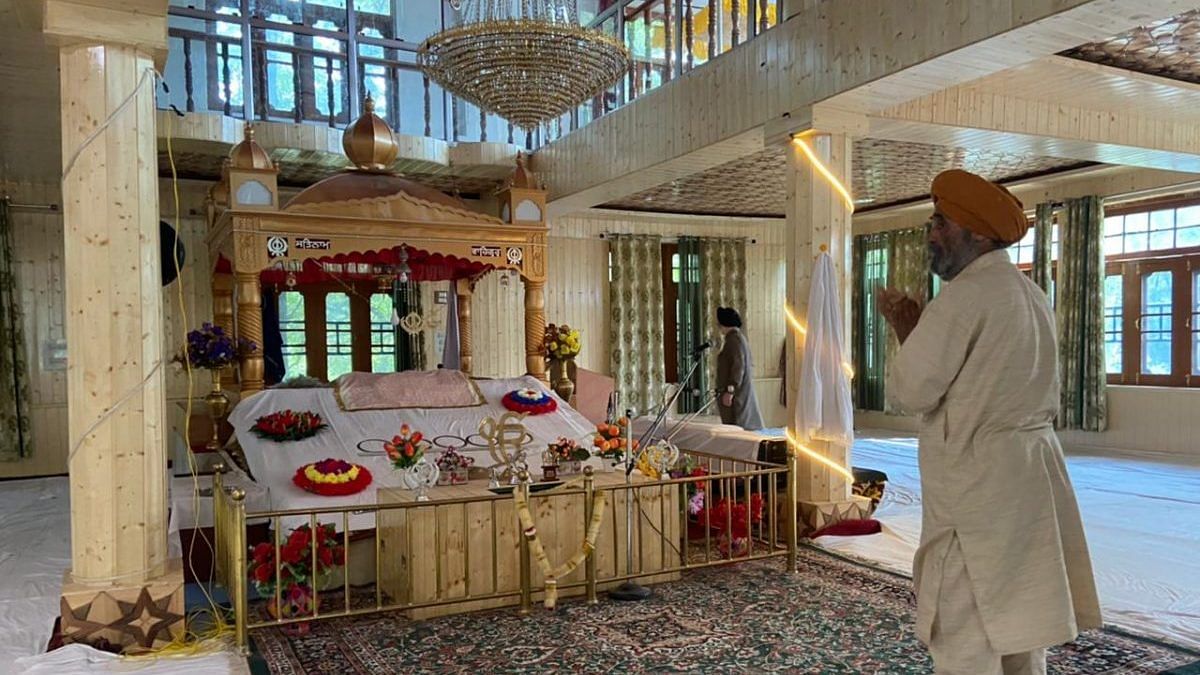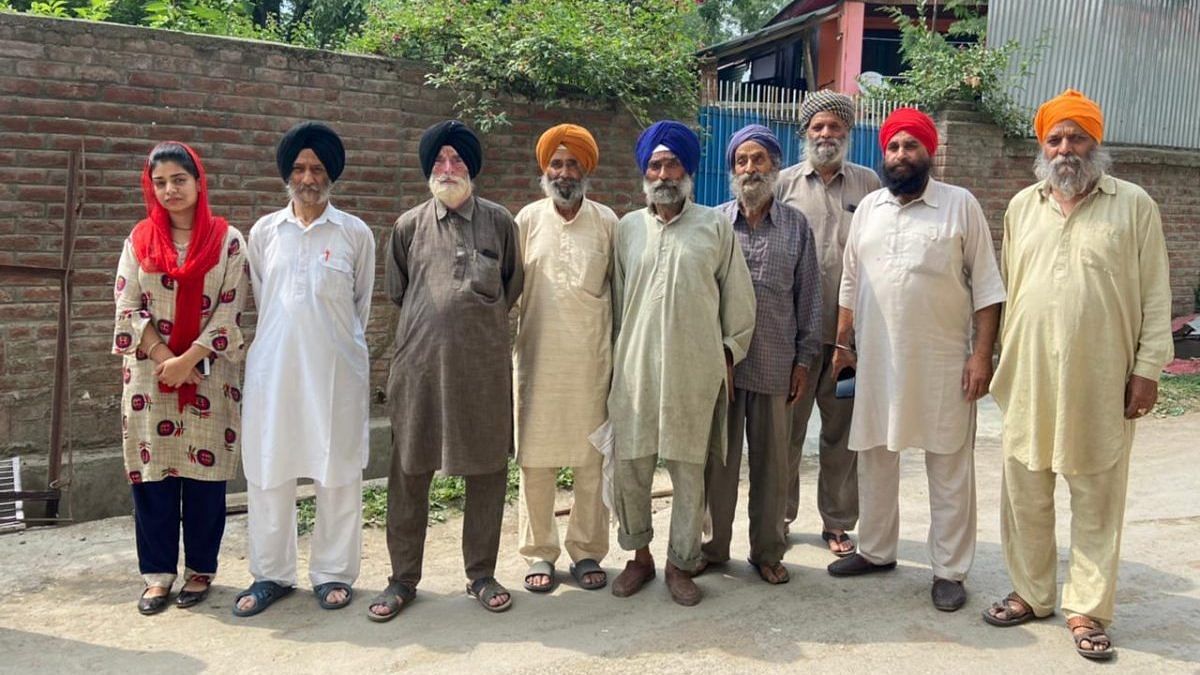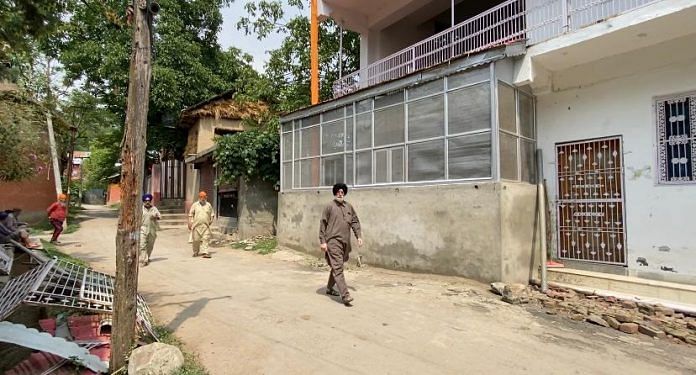Shatrugaon (Tral): The narrow and windy path cutting through the thick forests of Tral — a magnet for militant movement in South Kashmir — culminates at Shatrugaon, an all Sikh village spread across 8 km with a population of 1,500 people.
The residents here, surrounded by Muslim-majority villages, say they’ve lived in harmony for hundreds of years, even during the peak of militancy in the 1990s.
Their major grouse has always been that they were being ignored — by successive governments at the Centre and the state. They are now in the spotlight, and for all the wrong reasons, the residents say.
Shatrugaon’s villagers are among the Kashmiri Sikhs who constitute 1.87 per cent of the Valley’s population. Since last month, the Valley Sikhs are at the heart of a so-called ‘love jihad’ narrative, after a Sikh woman was whisked away from her Muslim husband in Srinagar and married off to a Sikh man.
The whole “non-issue of conversions”, said Valley Sikh leader Jagmohan Singh Raina, has taken away from their “actual concerns” — minority status in J&K, reservation in jobs for their children, recognition of Punjabi language, and political representation.
Raina is the president of the All Party Sikh Coordination Committee, a prominent Sikh body in J&K.
“There is no issue of any love jihad or forced conversions here. It has never been an issue and there is no fear. Yeh toh aag lagane wali baat hai (this is an attempt to create disharmony),” he told ThePrint.
“Yes, there have been a few cases of women being manipulated to convert, but that can happen anywhere. It is not that the Muslims are doing that intentionally to harm us. In most cases, these are love affairs.”
According to Surinder Singh, the pradhan of Shatrugaon and president of Gurudwara Prabandhak Committee in the area, their anger is not towards the Muslims but the central government for “ignoring the Sikhs of the valley” and for “highlighting the wrong cause”.
“Our problem is not with the local Muslims, but with the government that has never spoken or taken note of the Sikh community here,” he said. “We have been asking for a minority status, political representation, reservation in government jobs, but all our requests have always gone unheard.
“Now, when we finally got some attention, when people found out about a Sikh community in the Valley, it was for the wrong reasons,” he added.
According to Raina, the Sikhs in Kashmir go back over 500 years, when Guru Hargobind Sahib, the sixth Guru of Sikhs, made visits to the Valley. He said many historical Gurudwaras have been built across Jammu & Kashmir in commemoration of Guru Hargobind Sahib’s visit in 1620 A.D.

‘We are the one’s holding India’s flag in Kashmir’
Among the main concerns of Sikhs in the Valley is the “lack of political representation”. Despite being a part of the Valley for so many years, the Sikhs complain that they “never had any political representation to present their issues and ambitions”.
They now want a “Sikh Minority Commission” to be appointed with a Sikh chairman, apart from two legislative seats to be reserved for Kashmiri Sikhs at Tral and Baramulla.
“The Kashmiri Sikhs have been demanding minority status and representation in the state assembly for the longest time but to no avail,” said Baldev Singh Raina, chairman of the All District Gurdwara Management Committee.
“Since the delimitation process is happening now, we want the government to give at least two seats to Sikhs so that we at least have representatives in the government to talk about what concerns us as a community.”
Baldev Raina was part of a delegation that had met Home Minister Amit Shah on 4 July and raised these concerns.
Ajeet Singh, a resident of Shatrugaon who retired as a teacher, said Sikhs in Kashmir have always come out in “support of the Indian government”, even in turbulent times, and must be rewarded for that.
“During elections, there used to be a call in Kashmir from separatists that no one should vote, but the entire Sikh community always voted,” he said. “We always supported India, whether it be elections, or abrogation of Article 370, despite being in the middle of conflict but still we are never heard by the government.
“We are the ones who are holding India’s flag in the Valley, representing India here. We are not the ones who ran away. Should our voices not be heard?” he added.
Also read: Forced conversion or boomer-talk? Twitter’s verdict on interfaith marriages is one-sided
‘If Kashmiri Pandits have reservations in jobs, why not us?’
Sikhs number 1.5 lakh, with 60,000 voters living across 136 villages in Baramulla, Kupwara, Budgam, Pulwama, Anantnag and Srinagar areas of Kashmir. Most are into agriculture and own apple orchards, cornfields, while some also hold government jobs.
The community, however, feels that without any reservations or a quota in government jobs, like what Kashmiri Pandits have, the youngsters are finding it difficult to bag good jobs, which is leading to their migration.
“We need reservations, just like other minorities. We need jobs so that we can also represent our community in government offices here in Kashmir,” said 27-year-old Manpreet Kaur. “If Kashmiri Pandits can have representation, and Dogras can have it, then why not us?”
Manpreet has completed her Masters in Commerce and also holds a B.Ed degree from Kashmir University. She said she had applied for a government job several times but was not shortlisted.
Baldev Raina added that the government must consider appointing “micro minorities” living in Kashmir for the posts still vacant under the PM relief package for migrants.
“There are more than 50 per cent of those posts that are lying vacant. Those must be considered for Sikhs,” Raina said. “Also, if we are not given jobs and our children keep migrating, the Sikh community will become extinct.”

Members of the Sikh community at Shatrugaon. On the extreme left is Manpreet Kaur | Photo: Ananya Bhardwaj/ThePrint
Sikh women converting for better life
Although the Sikhs in the Valley said that there are no “forced conversions”, they still demand an “anti-conversion law”.
According to Manpreet Kaur, Sikh women in some cases are “drifting” and opting for “conversion” because they have no career opportunities.
“We hear these stories of conversion because women here do not have career options despite being so educated. They feel maybe by converting they could get a job, a better life,” she said.
“These women who convert are misguided. They are wrongly influenced and taken advantage of by people of the other community. Since these educated women have no career options, they are cajoled in the name of better life and a good career,” she added.
Kaur said that Sikh women were also converting because of a complete “lack of religious education and negligence of Punjabi language in the Valley”.
Representation in jobs, Manpreet said, is a solution to stop these conversions. “We should get representation in jobs, in sports which will make our women career-oriented. Give them career options, so that they do not drift and think of converting,” she said.
Her father, Ajit Singh, however, said that an anti-conversion law is required to maintain “harmony between the two communities”.
“These unemployed girls get ready to convert for a better life. Since they are sitting idle at home, they get distracted and conversions are a result of that,” he said. “Moreover, we feel that if an anti-conversion law comes, it will deter two people from the two communities from getting involved with each other and also help maintain the harmony between the two communities.”
Kaur too believes that an anti-conversion law is needed. “In our religion (Sikhism), our Guru Sahib strictly restricts a woman or a man to marry into any other religion. If that happens, it leads to tension, so an anti-conversion law will restrict the couples legally and will help avoid disputes between the two communities,” she said.
Fear losing their culture
The Sikhs here also fear losing their culture, after Punjabi was excluded from the Jammu and Kashmir list of official languages in a bill passed in September last year.
Currently, Kashmiri, Dogri, Hindi, Urdu, and English are on the list of official languages in the Union Territory of Jammu and Kashmir.
“The young generation is not in touch with our roots, our culture, our language,” said Sundar Pal Singh, a resident of Shatrugaon.
“Should it not bother us? We have been demanding that Punjabi be restored as an official language and must be taught in schools, but no one cares about us. Our children are drifting away from our culture.”
(Edited by Arun Prashanth)
Also read: J&K statehood a must for credible poll exercise, will instil faith, CPM’s Tarigami says



